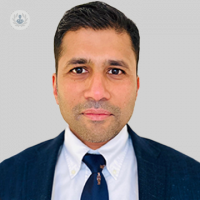Polycystic ovary syndrome: an expert guide
Written in association with:Polycystic ovary syndrome (PCOS) is a relatively common condition that alters the normal functioning of the ovaries, affecting fertility and menstruation. It causes variation in typical hormone levels, meaning that patients experience symptoms such as acne or irregular hair growth. PCOS is also connected with weight gain, sometimes leading to more serious conditions. It is difficult to establish the prevalence of PCOS. In some studies, however, as many as one in every ten women are estimated to have the condition. It is even more common in certain ethnic groups and families. In this article, esteemed consultant endocrinologist Dr Anand Velusamy gives an expert guide to the condition.

What are the symptoms of PCOS?
PCOS is the most common cause behind a consistent lack of ovulation, the phase of the menstrual cycle where an egg is usually released. A lack of regular monthly ovulation is referred to as anovulation. This is often, although not exclusively, related to the patient’s level of androgen. Androgen is a male hormone which is normally present in women but in women with PCOS is found at a relatively higher concentration. Periods in this case may completely stop or become much less regular, contributing to difficulty getting pregnant or even infertility.
Other symptoms of PCOS include:
- acne
- hirsutism: male pattern excess hair distribution on areas such as the face, neck, chest, belly button area, lower back, arms or inner thighs
- male pattern scalp hair loss
- excessive weight gain
- signs of insulin resistance
- difficulty losing weight
How is PCOS diagnosed?
The diagnosis is made by excluding other similar conditions which also cause elevation in male hormone levels. These include:
- non-classic congenital adrenal hyperplasia: a condition that has similar symptoms but a different prognosis and treatment
- high levels of prolactin: another type of hormone often referred to as the ‘milk hormone’ as it helps with breast feeding
- cushings disease: a condition associated with steroid excess
- acromegaly: a condition associated with growth hormone excess
- drug induced symptoms: caused by some medications that can provoke symptoms similar to those of PCOS
- ethnicity: certain ethnic populations have features of hirsutism without other symptoms of PCOS
The diagnosis is usually clinical and biochemical based on the patient’s symptoms meaning that there will be a clinical examination and some supportive blood tests. Doctors sometimes use a pelvic ultrasound to further reaffirm the diagnosis although this is not always necessary and can sometimes be misleading. This is because young adolescent women often have multiple follicles within the ovary that show on an ultrasound examination which can give a false impression of PCOS. Conversely, the opposite can be true in middle aged women.
Is PCOS life-threatening?
PCOS is not life threatening as such. However, there is a risk of developing obesity, insulin resistance and type 2 diabetes that can contribute to cardiovascular diseases. Additionally, a lack of regular menstruation or anovulation can cause infertility. These complications are likely to cause anxiety and depression and hence, the treatment of PCOS is often tailored to the patient’s needs according to their stage of life. It is very important for the responsible clinician to adapt a holistic approach.
What happens if you leave PCOS untreated?
PCOS can be graded as a spectrum with severity scale ranging from 1-10 depending on a range of factors including: symptoms, physical features, patients’ perception (including anxiety and depression), social circumstances, productivity, biochemistry, infertility and cardiovascular illnesses.
Untreated or unrecognised PCOS can often result in the exacerbation of these factors. Consider these examples:
A patient at the mild end of the spectrum, perhaps a one on the scale, may have a healthy body mass index (BMI), no major acne or hirsutism, regular monthly menstrual periods and normal fertility levels. This patient may not require any specific treatment.
At the other end of the scale, perhaps a ten, symptoms of obesity, diabetes, high blood pressure, hirsutism, acne, infertility and depression are likely to be very severe. As such, the responsible clinician should be able to recognise their individual progression and tailor the treatment accordingly.
Last but not least, with chronic amenorrhoea (a lack of periods), along with infertility, there is also a risk of endometrial hyperplasia. This a condition which may lead to the development of malignant (cancerous) cells. It is therefore very important to seek early treatment and adopt an appropriate follow up plan with a specialist.
What types of medicine are used to treat PCOS?
Medical management of the condition should be tailored to the patient’s need and symptoms. Each symptom of PCOS can be treated individually and there are a range of treatment options available.
Weight loss, of around ten to twenty percent, is recommended for patients whose BMI ranges from overweight to obese. This has been proven to help regulate the menstrual cycle, potentially improving fertility and additionally improving hirsutism to a certain degree. Some prescription medication along with lifestyle advice could also help patients to avoid developing insulin resistance and type 2 diabetes.
To treat irregular menstruation or amenorrhoea, contraceptive pills (combined or progesterone) and IUDs such as the mirena coil may be prescribed. The combined oral contraceptive pill along with others, may in turn also treat hirsutism and acne. It is also possible that patients may be referred to a fertility unit or to a counselling service to treat depression. For patients with severe obesity, along with medical management, bariatric (weight loss) surgery is also an effective option.
If you are suffering from symptoms of PCOS or have already been diagnosed with the condition and would like to discuss your treatment options, you can book a consultation with Dr Anand Velusamy by visiting his Top Doctors profile.


